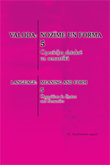Infinitīvs kā sekundāri predikatīvs komponents
Infinitive as a semi predicative component
Author(s): Agita KazakevičaSubject(s): Language and Literature Studies, Theoretical Linguistics, Baltic Languages
Published by: Latvijas Universitātes Akadēmiskais apgāds
Keywords: infinitīvs; sekundārā predikativitāte; puspredikatīvs komponents; subjekta infinitīvs; objekta infinitīvs; verba patstāvīgā un palīgnozīme;
Summary/Abstract: The infinitive may be analysed as a semi predicative component in sentences where its function is to expand the underlying structural pattern of a simple sentence. It is possible to distinguish between two principal types of such constructions in modern Latvian – constructions with semi predicative subject infinitives and constructions with semi predicative object infinitives.The study provides a summary of the treatment that the infinitive has received in the past in the work of Jūlijs Kārkliņš and other syntacticians as a semi predicative component. The resulting synthesis of approaches is then used as a basis for analysing and classifying the collected language material. The overall (more general) objective of the study has been to catalogue the types of sentences that incorporate the infinitive in their structure in one way or another in modern written Latvian.The infinitive is, clearly, a widespread means of expressing additional, viz. secondary or subordinate, predication in Latvian, and it is arguably more laconic, economical in form than, for example, participial clauses and some other types of constructions used to express additional action. The status of the infinitive following a noun as a semi predicative component, however, remains controversial in Latvian linguistics and requires further research.
Journal: Valoda: nozīme un forma
- Issue Year: 2014
- Issue No: 5
- Page Range: 80-87
- Page Count: 8
- Language: Latvian

